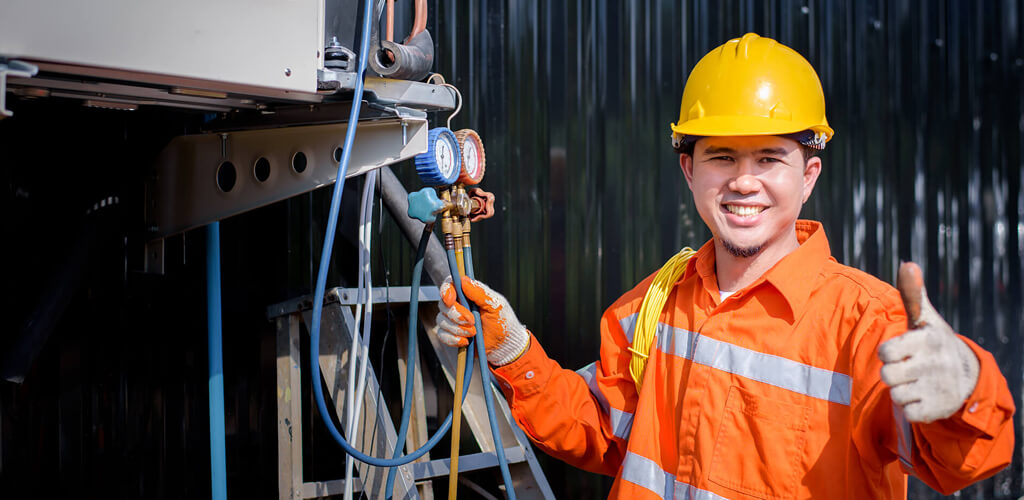Are you looking to kickstart a rewarding journey in Heating, Ventilation, and Air Conditioning (HVAC)? Uncertain about the various avenues available to you? Whether you’re fresh out of high school or have completed an HVAC/BR program, this guide can help steer you towards promising opportunities.
Keep in mind that this is just a starting point, and the world of HVAC careers offers even more possibilities that can be tailored to your interests and aspirations.
Understanding HVAC
HVAC stands for Heating, Ventilation, and Air Conditioning, encompassing systems designed to regulate air quality, temperature, and humidity. It might also include Refrigeration (HVAC/R) for those specializing in refrigeration systems. HVAC technicians handle tasks like installing, maintaining, troubleshooting, and repairing climate control and refrigeration setups.
While HVAC technicians are versed in the installation and maintenance of refrigeration systems, HVAC/R technicians receive additional training to excel in the proper handling, maintenance, and repair of cooling and refrigeration systems. This could involve equipment like refrigerators, ice machines, walk-in coolers, vending machines, and more.
HVAC school programs may be referred to as Heating, Ventilation, Air Conditioning, and Basic Refrigeration (HVAC/BR) programs. They provide instruction on correct handling, disposal, and recycling of refrigerants in accordance with environmental regulations like the Clean Air Act.
Starting Points for Entry-Level HVAC Careers
For those who’ve completed post-secondary training but lack prior HVAC/R experience, these positions are ideal. They require the use of hand and power tools, often involving lifting heavy objects during installations and maintenance.
HVAC Apprentice
Apprenticeships offer aspiring technicians (known as apprentices) the opportunity to learn while they pursue their education. Throughout the apprenticeship, apprentices earn a wage as they acquire practical experience. Starting with routine HVAC tasks, they gradually take on more complex challenges under the guidance of a Journeyperson. Upon completion, apprentices graduate to become Journey-Level Technicians.
Apprenticeships can be pursued independently or in tandem with an HVAC or HVAC/BR program, potentially expediting the process. They might work with commercial or residential clients.
Helper
Also referred to as a Residential Trainee, Helpers support lead installers or technicians during installations, maintenance, and repairs. They might handle minor electrical repairs related to heating, air conditioning, and refrigeration systems.
Helpers play a crucial role in ensuring HVAC systems meet industry standards and regulations. They troubleshoot equipment, provide expert advice to clients, and oversee material deliveries to job sites.
Commercial Trainee
Often called a Commercial HVAC Service Technician Trainee or Installer Trainee, individuals in this role work under the supervision of experienced HVAC technicians. Similar to Helpers, Trainees assist with installation, maintenance, and repair of HVAC systems. They troubleshoot mechanical and electrical issues, adhere to industry standards, and coordinate equipment deliveries.
Evolving HVAC Roles with Experience
These positions are well-suited for those with post-secondary training and at least one year of HVAC/R work experience. Additionally, specialized HVAC or HVAC/R certifications like Environmental Protection Agency (EPA) 608 and North American Technical Excellence (NATE) certifications are typically required. These certifications showcase expertise in training, industry standards, refrigerant handling, and more.
Residential HVAC Installer
Residential HVAC Installers focus on installing new HVAC systems in homes. They might remove old systems, conduct maintenance, and handle minor repairs. Ensuring optimal system performance, Installers troubleshoot installations, adjust systems, and interact with customers to provide recommendations and feedback.
Commercial HVAC Installer
Working in diverse settings like industrial properties, medical facilities, and hotels, Commercial HVAC Installers install heating and air conditioning systems. They diagnose issues, replace faulty parts, and ensure compliance with standards using blueprints and schematics.
HVAC Technician
In addition to installations and repairs, HVAC Technicians inspect and diagnose climate control and ventilation systems. They handle emergencies, perform repairs, order parts, mentor junior team members, and maintain communication with customers and suppliers. Their tasks span pipes, duct systems, furnaces, air conditioning units, and more.
Considering Alternative HVAC Paths
If you’re skilled in HVAC/R but prefer not to engage directly in installations or repairs, consider HVAC sales roles. Leveraging your HVAC knowledge, you can sell parts and supplies. These roles often require experience in the field and might involve interpreting blueprints and manuals.
Examples of HVAC sales positions include HVAC Counter Sales, HVAC Outside Sales Associate, HVAC Sales Specialist, and HVAC Service Maintenance Sales.
In Conclusion
Apprenticeships and entry-level positions are valuable for newcomers, offering the chance to learn from experienced professionals and build skills. HVAC installers excel in either residential or commercial contexts, ensuring smooth system installations. HVAC technicians handle diverse responsibilities, from repairs to mentoring.
For those inclined toward sales, utilizing HVAC expertise to recommend and sell parts can be a fulfilling alternative. Remember, your HVAC journey can be shaped to match your passions and strengths. To embark on your HVAC career, visit our website to learn about our HVAC/R Technician program.

